Today’s success is set to continue


A compelling option for everyone
The record sales achieved by SUVs make it hard to deny that these vehicles have been a runaway success. The results of L’Observatoire Cetelem de l’Automobile 2022 clearly support this point. SUVs hold great appeal and they have stamped their mark. Those who try them out tend to be won over. 6 out of 10 SUV owners state that they would choose an SUV again if they were to buy a vehicle within the next 12 months. SUV owners in the UK and the US, where SUV sales are the highest, as well as in Turkey and Brazil, are the most likely to make this choice (68%, 67%, 67% and 67%). Conversely, the Belgians and Poles are less enthusiastic, although a very slim majority would still pick this option (49% and 50%). The French post a score that is close to the overall average.
But most strikingly, almost a third of non-SUV owners would be prepared to opt for such a vehicle and, more importantly, they are more likely to do so than to buy a saloon car (19%) or a city car (18%) (Fig 26).
Fig 26 – Vehicle type preferences for purchase
Download this infographic for your presentations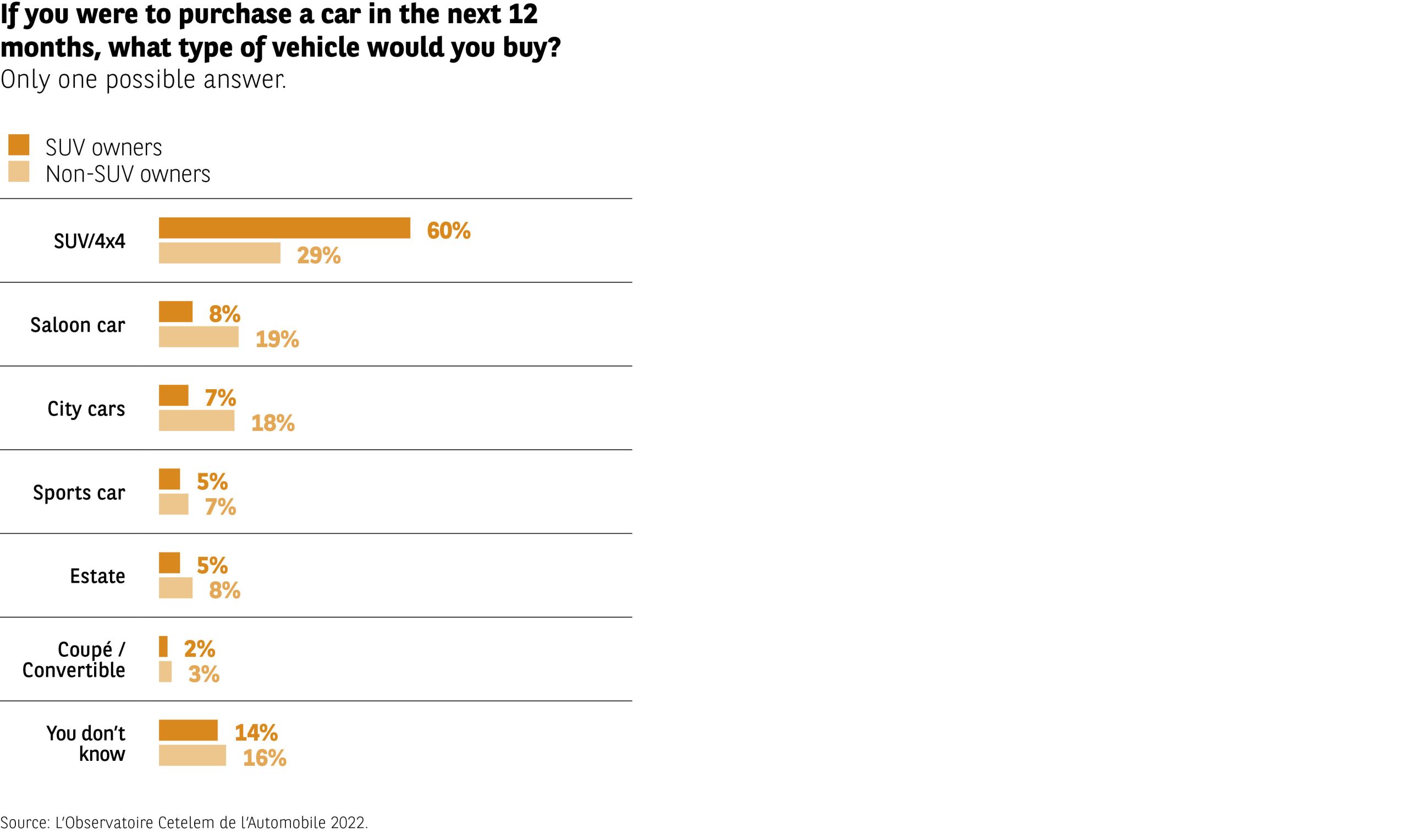 the graphic compares respondents’ preferred vehicle types for a possible purchase within the next 12 months. Two groups are shown: SUV owners and non-owners.
Data:
• SUV / 4×4: 60% owners, 29% non-owners
• Sedan: 8% / 19%
• City car: 7% / 18%
• Sports car: 5% / 7%
• Station wagon: 5% / 8%
• Coupé / convertible: 2% / 3%
• Don’t know: 14% / 16%
Main takeaway: owners strongly favor SUVs, whereas non-owners lean more toward other categories.
Source: L’Observatoire Cetelem de l’Automobile 2022.
the graphic compares respondents’ preferred vehicle types for a possible purchase within the next 12 months. Two groups are shown: SUV owners and non-owners.
Data:
• SUV / 4×4: 60% owners, 29% non-owners
• Sedan: 8% / 19%
• City car: 7% / 18%
• Sports car: 5% / 7%
• Station wagon: 5% / 8%
• Coupé / convertible: 2% / 3%
• Don’t know: 14% / 16%
Main takeaway: owners strongly favor SUVs, whereas non-owners lean more toward other categories.
Source: L’Observatoire Cetelem de l’Automobile 2022.
In Brazil and South Africa, non-owners who intend to buy an SUV in the near future are actually in the majority (52% and 51%). Those most resistant to this idea can be found in the Netherlands, Japan and the United Kingdom (12%, 15% and 15%). Non-SUV owners in France, Germany and Belgium are also rather dubious (19%) (Fig 27).
Fig 27 – SUV purchase intention by country
Download this infographic for your presentations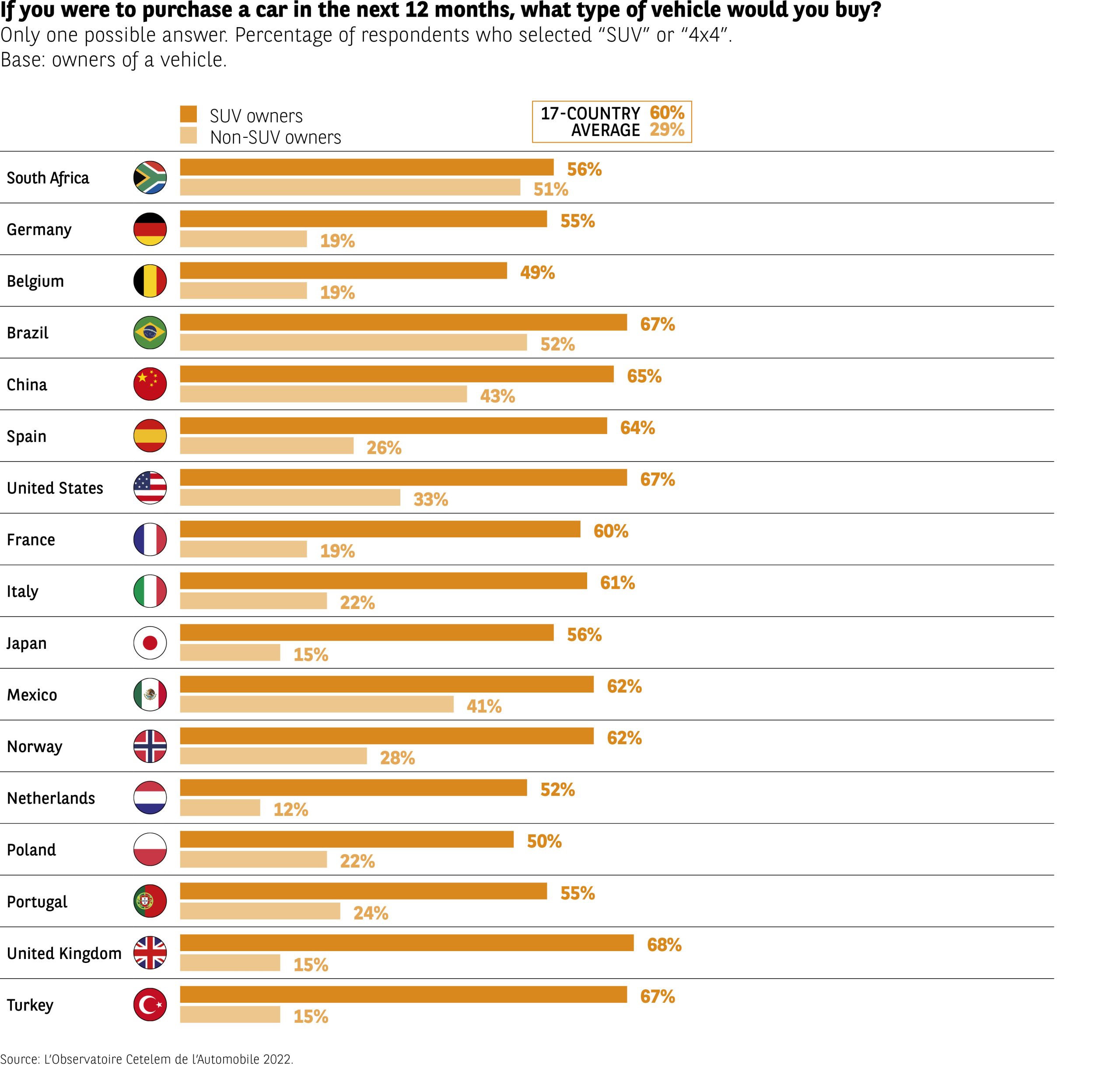 The visual compares, across 17 countries, the percentage of respondents who say they intend to buy an SUV or a 4×4 within the next 12 months. Two groups are presented: SUV owners and non-owners.
The reported averages are 60% for owners and 29% for non-owners.
Data by country (owners / non-owners):
South Africa: 56% / 51%
Germany: 55% / 19%
Belgium: 49% / 19%
Brazil: 67% / 52%
China: 65% / 43%
Spain: 64% / 26%
United States: 67% / 33%
France: 60% / 19%
Italy: 61% / 22%
Japan: 56% / 15%
Mexico: 62% / 41%
Norway: 62% / 28%
Netherlands: 52% / 12%
Poland: 50% / 22%
Portugal: 55% / 24%
United Kingdom: 68% / 15%
Turkey: 67% / 15%
Main takeaway: in every country, owners show a higher intention to buy an SUV than non-owners.
Source: L’Observatoire Cetelem de l’Automobile 2022.
The visual compares, across 17 countries, the percentage of respondents who say they intend to buy an SUV or a 4×4 within the next 12 months. Two groups are presented: SUV owners and non-owners.
The reported averages are 60% for owners and 29% for non-owners.
Data by country (owners / non-owners):
South Africa: 56% / 51%
Germany: 55% / 19%
Belgium: 49% / 19%
Brazil: 67% / 52%
China: 65% / 43%
Spain: 64% / 26%
United States: 67% / 33%
France: 60% / 19%
Italy: 61% / 22%
Japan: 56% / 15%
Mexico: 62% / 41%
Norway: 62% / 28%
Netherlands: 52% / 12%
Poland: 50% / 22%
Portugal: 55% / 24%
United Kingdom: 68% / 15%
Turkey: 67% / 15%
Main takeaway: in every country, owners show a higher intention to buy an SUV than non-owners.
Source: L’Observatoire Cetelem de l’Automobile 2022.
A preference for electricity
The vast majority of those who will opt for an SUV in the future will go down the electric route. That is true for 66% of SUV owners and 61% of non-SUV owners (Fig 28).
On this environmentally-tinged question, the trio comprising Germany, France and Belgium appear to be much less excited about the prospect, with the French displaying the least fondness for the electric option. The level of enthusiasm among both populations of motorists is particularly high in Turkey, China and Brazil, but also Italy.
Fig 28 – Interest in electric or hybrid vehicles
Download this infographic for your presentations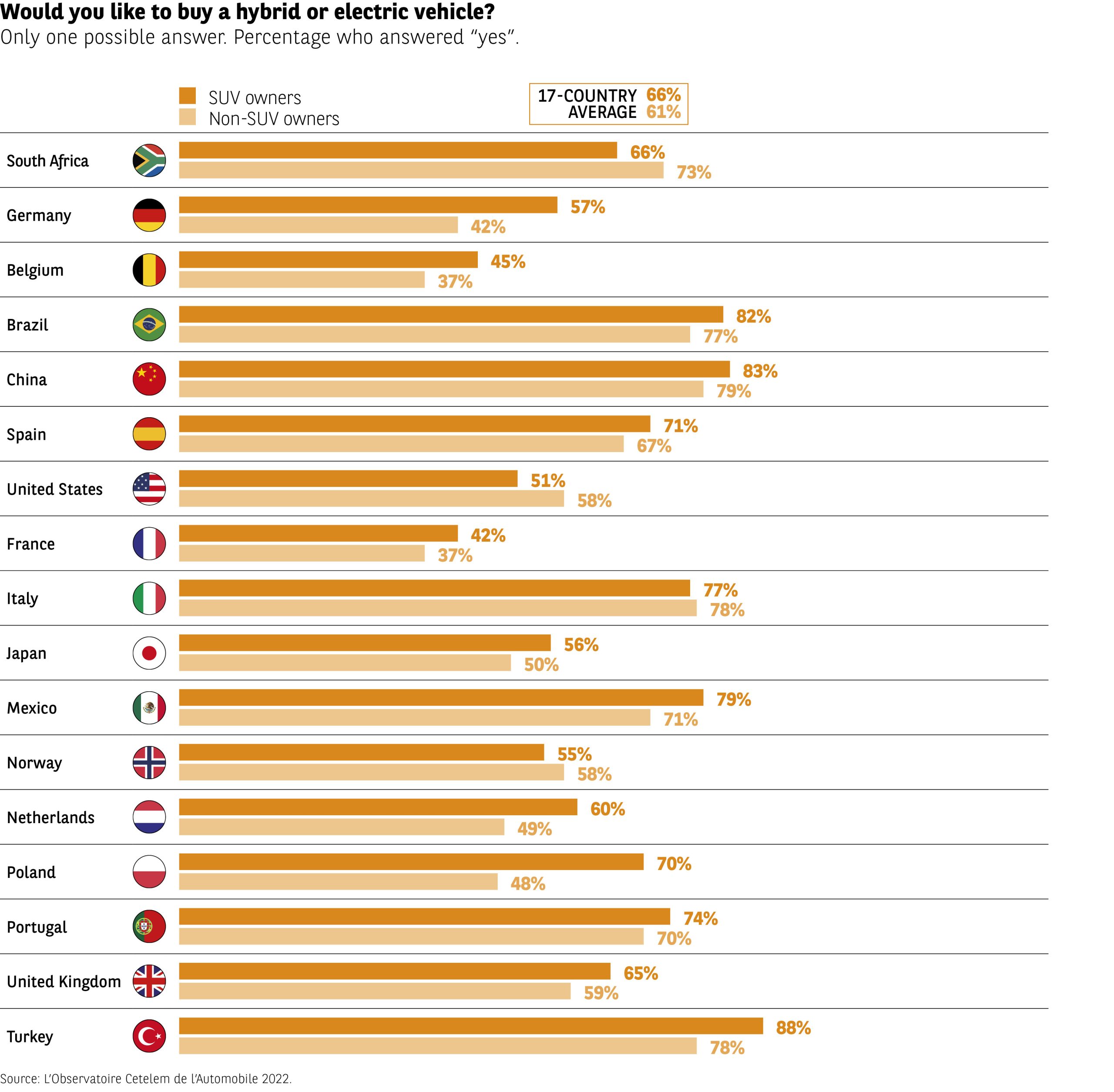 The graphic shows, across 17 countries, the proportion of respondents who say they would choose an electric or a hybrid vehicle. Two groups are reported: SUV owners and non-owners.
The averages shown are 66% for owners and 61% for non-owners.
Data by country (owners / non-owners):
South Africa: 66% / 73%
Germany: 57% / 42%
Belgium: 45% / 37%
Brazil: 82% / 77%
China: 83% / 79%
Spain: 71% / 67%
United States: 58% / 51%
France: 42% / 37%
Italy: 77% / 78%
Japan: 56% / 50%
Mexico: 79% / 71%
Norway: 58% / 55%
Netherlands: 60% / 49%
Poland: 70% / 48%
Portugal: 74% / 70%
United Kingdom: 65% / 59%
Turkey: 88% / 78%
Main takeaway: interest in electric or hybrid powertrains is high across most countries, with differences between markets.
Source: L’Observatoire Cetelem de l’Automobile 2022.
The graphic shows, across 17 countries, the proportion of respondents who say they would choose an electric or a hybrid vehicle. Two groups are reported: SUV owners and non-owners.
The averages shown are 66% for owners and 61% for non-owners.
Data by country (owners / non-owners):
South Africa: 66% / 73%
Germany: 57% / 42%
Belgium: 45% / 37%
Brazil: 82% / 77%
China: 83% / 79%
Spain: 71% / 67%
United States: 58% / 51%
France: 42% / 37%
Italy: 77% / 78%
Japan: 56% / 50%
Mexico: 79% / 71%
Norway: 58% / 55%
Netherlands: 60% / 49%
Poland: 70% / 48%
Portugal: 74% / 70%
United Kingdom: 65% / 59%
Turkey: 88% / 78%
Main takeaway: interest in electric or hybrid powertrains is high across most countries, with differences between markets.
Source: L’Observatoire Cetelem de l’Automobile 2022.
A groundswell against restrictions
Unsurprisingly, while the idea of sales restrictions is sometimes put forward as a way of ending the potentially negative impact of SUVs on the environment, motorists are opposed to such measures.
Only 30% of SUV-owners would be in favour, which is more or less the same proportion as those who would not buy one again. A peak of 52% can be observed in Poland, with SUV owners being even more supportive of such measures than non-owners) (Fig 29). With 23%, Mexico posts the lowest score.
Fig 29 – Views on limiting future SUV sales
Download this infographic for your presentations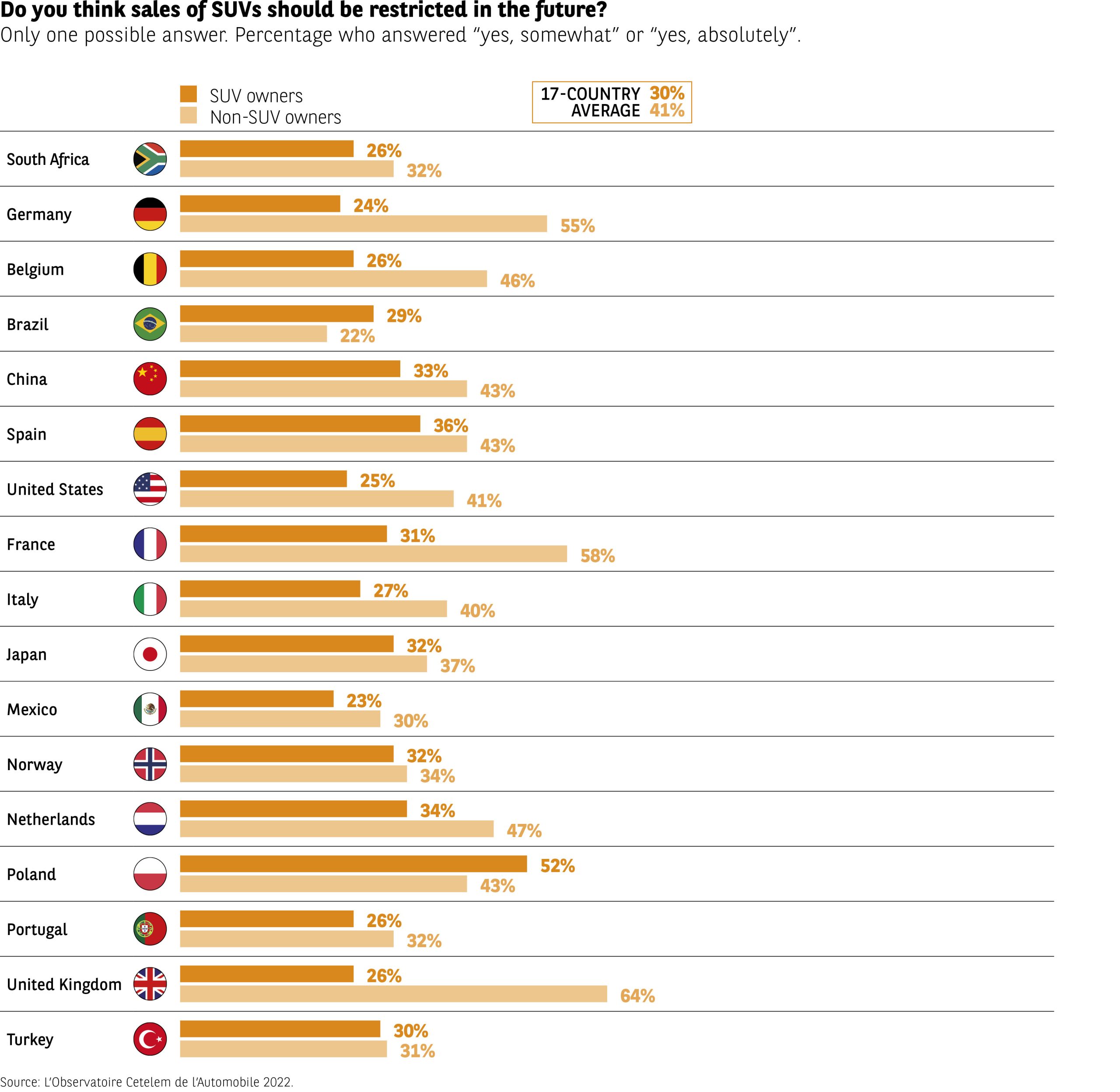 The graphic compares, across 17 countries, the share of respondents who believe SUV sales should be limited or strongly limited in the future.
The reported averages are 30% for owners and 41% for non-owners.
Data by country (owners / non-owners) :
South Africa: 26% / 32%
Germany: 24% / 55%
Belgium: 26% / 46%
Brazil: 29% / 22%
China: 33% / 43%
Spain: 36% / 43%
United States: 25% / 41%
France: 31% / 58%
Italy: 27% / 40%
Japan: 32% / 37%
Mexico: 23% / 30%
Norway: 32% / 34%
Netherlands: 34% / 47%
Poland: 34% / 52%
Portugal: 26% / 32%
United Kingdom: 26% / 64%
Turkey: 30% / 31%
Main takeaway: support for future limits on SUV sales is higher among non-owners, with wide variation across countries.
Source: L’Observatoire Cetelem de l’Automobile 2022.
The graphic compares, across 17 countries, the share of respondents who believe SUV sales should be limited or strongly limited in the future.
The reported averages are 30% for owners and 41% for non-owners.
Data by country (owners / non-owners) :
South Africa: 26% / 32%
Germany: 24% / 55%
Belgium: 26% / 46%
Brazil: 29% / 22%
China: 33% / 43%
Spain: 36% / 43%
United States: 25% / 41%
France: 31% / 58%
Italy: 27% / 40%
Japan: 32% / 37%
Mexico: 23% / 30%
Norway: 32% / 34%
Netherlands: 34% / 47%
Poland: 34% / 52%
Portugal: 26% / 32%
United Kingdom: 26% / 64%
Turkey: 30% / 31%
Main takeaway: support for future limits on SUV sales is higher among non-owners, with wide variation across countries.
Source: L’Observatoire Cetelem de l’Automobile 2022.
While 41% of non-owners do not agree with such restrictions either, the differences between the countries are much more pronounced in this instance. Indeed, the majority of non-SUV owners in the UK, France and Germany are in favour, posting figures more than twice as high as SUV owners in the UK and Germany.
A moderate appetite for penalties
When asked about measures less drastic than restricting the sale of SUVs, motorists are equally cautious. None of the items put forward for consideration attract the support of a majority of SUV owners. This is true for speed limits and ecotaxes on combustion engine SUVs (45%), as well as taxes on the heaviest vehicles (40%) (Fig 30).
It is even more true when it comes to increasing their price (31%), banning them from urban centres (30%) and banning their advertising (26%). With regard to the first three items mentioned, a slight majority of non-SUV owners support these measures. On all these issues, the Norwegians are alone in being consistently more tolerant than average.
Fig 30 – Views on regulatory measures related to SUVs
Download this infographic for your presentations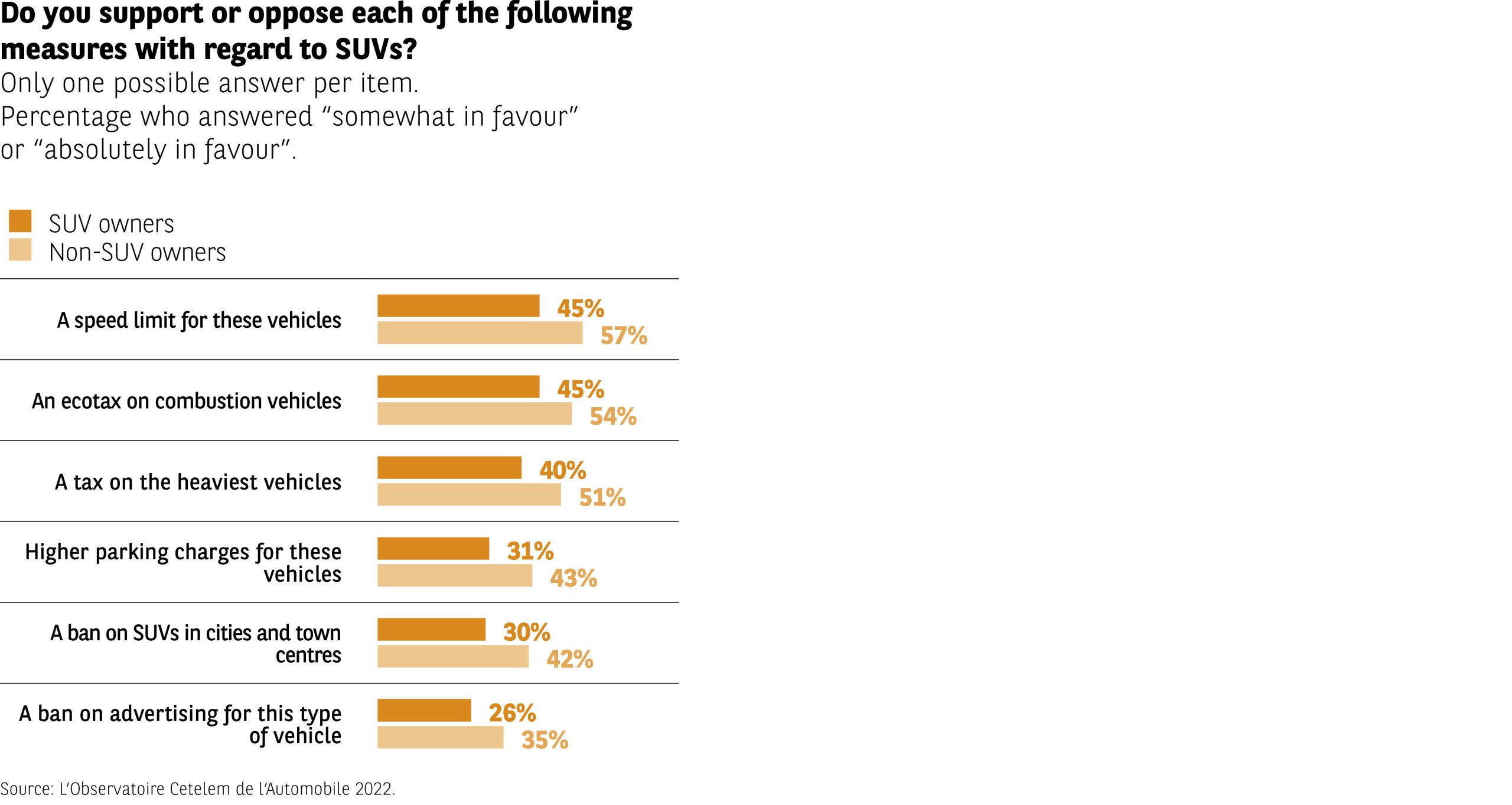 The graphic displays the share of respondents who are “somewhat favorable” or “very favorable” to several proposed measures concerning SUVs.
Data:
– Maximum speed limitation: 45% owners, 57% non-owners
– Environmental penalty for combustion vehicles: 45% / 54%
– Penalty for heavier vehicles: 40% / 51%
– Increase in parking fees: 31% / 43%
– Exclusion of SUVs from major cities: 30% / 42%
– Ban on advertising for this type of vehicle: 26% / 35%
Main takeaway: non-owners show consistently higher support for all proposed measures.
Source: L’Observatoire Cetelem de l’Automobile 2022.
The graphic displays the share of respondents who are “somewhat favorable” or “very favorable” to several proposed measures concerning SUVs.
Data:
– Maximum speed limitation: 45% owners, 57% non-owners
– Environmental penalty for combustion vehicles: 45% / 54%
– Penalty for heavier vehicles: 40% / 51%
– Increase in parking fees: 31% / 43%
– Exclusion of SUVs from major cities: 30% / 42%
– Ban on advertising for this type of vehicle: 26% / 35%
Main takeaway: non-owners show consistently higher support for all proposed measures.
Source: L’Observatoire Cetelem de l’Automobile 2022.
Key figures

- 7/ 10 SUV owners use their car to go on holiday
- 15,251 the average number of kilometres SUVs are driven annually, compared with 13,506 km for other types of vehicle
- 34% of SUV owners hesitated before buying their vehicle because they were concerned about fuel consumption
- 3 values associated with SUVs: a family vehicle, off-road capability and safety
- 29% of non-SUV owners are thinking of buying one within the next 12 months
- 7/ 10 respondents believe that an electric SUV pollutes less than a combustion vehicle
